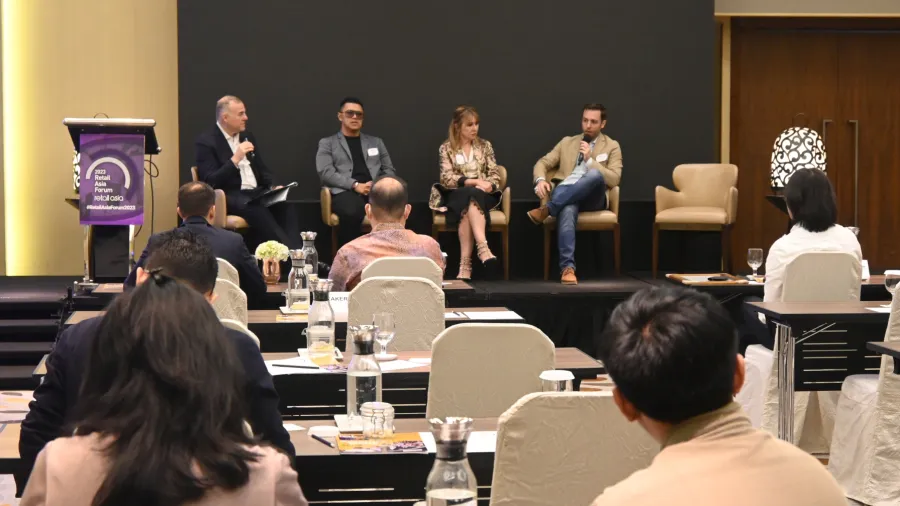
Digitalisation and sustainable retail on the rise in post-pandemic Indonesia
Retail Asia Jakarta Forum discovers new trends, preferences and passions in 2023 from industry leaders and experts.
The Retail Asia Jakarta Forum rolled out at the Pullman Hotel last 4 May 2023 with industry experts dishing out interesting insights on how physical stores should be redefining what’s attractive to shoppers, understanding their preferences, and sharing in their passions for eco-friendly brands.
Coming out of the pandemic, the timely issues discussed by the nine speakers invited at the forum delved on the changing retail trends, business diversification, digitalisation, and machine learning in retail.
Consumer trends
Starting off the day’s affairs, KPMG Partner and Head of Clients and Market Susanto delivered his presentation on “Global and Asia Pacific Consumer & Retail Trends.”
He began by saying that the “new normal era” brings about changes, among them: the rise of IoT or the internet of things; the impact of COVID-19; changing demographics that see the rise in Gen Z consumers; and retailers driving new tech and innovation with focus on hooking customers through AI/Data/VR platforms.
Susanto said retail trends in 2023 include the return of physical stores where digitally powered in-store experiences will increase. “The boundaries between digital and physical (shopping) are blurring where customers now exhibit greater agility toward all channels,” he said.
Today’s trends also lean towards increased digital investment and addressing consumers’ demand for more socially responsible retail. These perceptions drive businesses to improve energy efficiency in operations and innovate with eco-friendly materials in product development to achieve their sustainability goals.
Diversification
The Jakarta forum also welcomed Eric Lee, chief of merchandising and planning at Erajaya Digital, onstage to highlight how his company is no longer limited to just mobile phones with its decision to grow the business through diversification.
Erajaya, he said, has been growing into various businesses such as lifestyle, grocery, F&B, beauty, and healthcare stores that appeal to broader customer segments. “We are focusing on providing better-quality living by offering relevant products to the customer,” Eric said.
Giving advice on key winning factors for diversification, Lee stressed the importance of customer relationship management, human capital, channel development, technology enablement, supply chain management, and finance.
Southeast Asia retail
Examining the impact of the pandemic on retail experiences in Southeast Asia, Euromonitor International Research Manager Hiromi Yamaguchi cited the accelerated shift towards digital channels in retail and the significant growth of e-commerce in Indonesia in 2022.
To illustrate the impact of digitalisation and sticky purchase habits, Euromonitor logged the following growth: 33.4% in e-commerce, 10% in grocery retail, 8.7% in non-grocery retailers, and 3% in direct selling.
Yamaguchi said the key drivers shaping the future of retail in the region are digital shopping and engagement where online channels are a strategic priority for retailers; rethinking the store where enhancing in-store experience is a focus; and addressing sustainability.
Modern retail goals
From providing insights to drawing them out, Susanto moderated the panel discussion on “Transforming Retail: The Power of Digital Channels, Hyper-Personalization and Sales Training for Competitive Advantage” with Henry Pfisterer, sports and digital enthusiast from Decathlon Indonesia, and Fernando Repi, vice chairman of the Association of Indonesian Retailers (Aprindo).
Pfisterer talked about the sporting equipment retailer’s goal of moving people into modern sports and providing them all they need, even a coach, through an app. “We have what is called a personalized target. For example, if a shopper sees our website and he has a passion for golf, then he can click on ‘Golf’ and he can see golf equipment, the right clothes for golf to a selection of golf balls at various prices,” he said.
Meanwhile, Fernando spoke about the impact of the pandemic on the retail sector in Indonesia, where retailers turned to social media to communicate with shoppers during shop closures. He emphasized the importance of adapting to technology such as AI and big data.
“But even though retail also sells in an omnichannel manner, we still need to improve the shopper experience when they shop offline by increasing the ability of employees in the retail sector not only to adapt to technology but also to act as advisors by providing informative explanations to shoppers,” he said.
Machine learning in Retail
Meanwhile, Septian Waluyan, a partner at YCP Solidiance, shared his insights on the power of machine learning (ML) to predict demand. His talk at the Jakarta Forum covered the ongoing process of utilizing ML, which includes reviewing data, defining business goals and success metrics, understanding and preparing data, developing an ML model, training and deploying it.
To demonstrate the potential of ML in action, Septian presented a case study from the fashion industry. In fashion, keeping up with trends is critical, but smaller fashion labels often struggle to stay on top of ever-changing fashion trends. However, by leveraging the predictive power of ML, trend prediction can be automated by analyzing social media posts from fashion designers and influencers. This could allow fashion labels to identify trends earlier and capitalize on them, resulting in increased sales.
ML is highly beneficial in the fashion industry where trends change frequently. Automating trend analysis will, no doubt, revolutionize the fashion industry and Waluyan’s insights offered a valuable glimpse into its potential to ensure success of a business.
Navigating the shifting tides
Joining Tim Charlton, publisher of Retail Asia and panel moderator, for the final session on the topic, “Navigating the Shifting Tides of E-commerce: Strategies for Security, Personalization, Expansion, and Legal Integration,” were three esteemed executives from Baba Rafi Enterprise, HappyFresh, and Matahari Department Store.
Hendy Setiono, founder & CEO of Baba Rafi, talked about his experience in overseeing the franchise brand and other F&B brands and shared his views on strategies for expanding and diversifying a business in the e-commerce space.
Filippo Candrini, who is the managing director of HappyFresh, shared insights on his company’s approach to providing fresh groceries and improving the online shopping experience in Jakarta. HappyFresh provides personal shopper drivers and makes customers supermarket partners through their loyalty program.
Finally, Rachel Stack, chief merchandising officer at Matahari, discussed their department store’s expansion into the e-commerce space through Matahari.com. She took pride in how the Matahari Online Store has integrated itself into the largest marketplaces in Indonesia such as Tokopedia, Shopee and Lazada.

















 Advertise
Advertise







